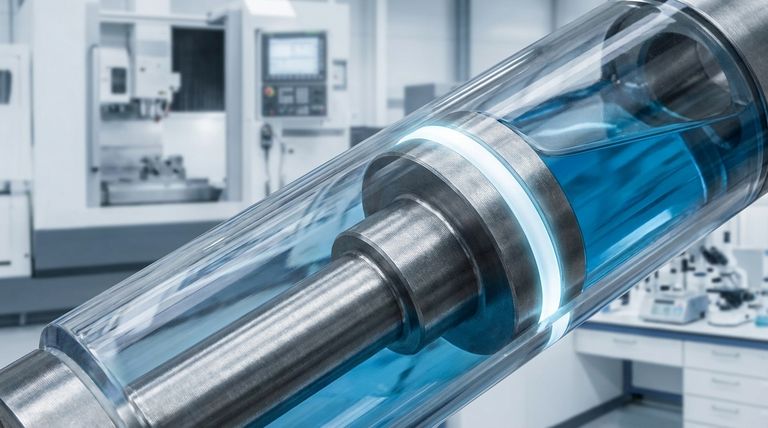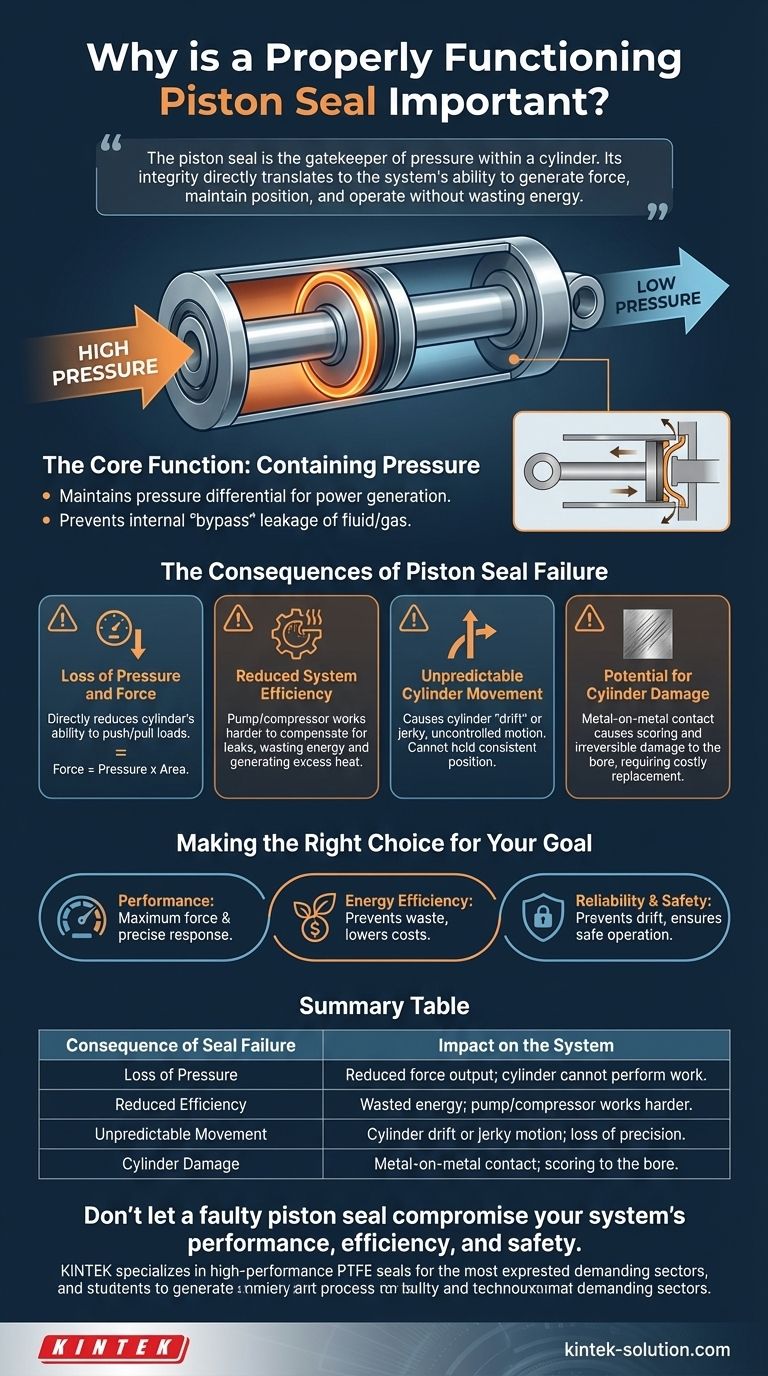A properly functioning piston seal is the critical component that allows hydraulic and pneumatic cylinders to convert pressure into useful work. It is an elastic ring on the piston that forms a tight barrier, preventing the loss of fluid or air pressure as the piston moves. Without this seal, a cylinder cannot operate efficiently, reliably, or safely.
The piston seal is the gatekeeper of pressure within a cylinder. Its integrity directly translates to the system's ability to generate force, maintain position, and operate without wasting energy.

The Core Function: Containing Pressure
A cylinder's power comes from a pressure differential—higher pressure on one side of the piston and lower pressure on the other. The piston seal is solely responsible for maintaining this difference.
What is a Piston Seal?
A piston seal is an elastic sealing ring, typically made of a polymer, that sits in a groove on the piston.
As the piston moves, this ring presses against the inner wall of the cylinder, creating a dynamic, yet robust, barrier.
How it Prevents Leaks
The primary purpose of the seal is to prevent the working fluid (hydraulic oil) or gas (compressed air) from leaking past the piston from the high-pressure side to the low-pressure side.
This internal leakage, often called "bypass," is what the seal is designed to eliminate.
The Consequences of Piston Seal Failure
When a piston seal degrades or fails, the consequences are immediate and affect the entire system. The seemingly small component failure leads to significant operational problems.
Loss of Pressure and Force
The most direct result of a leaking seal is a loss of pressure.
Because force is a direct product of pressure and area (Force = Pressure x Area), any drop in pressure immediately reduces the cylinder's ability to push or pull a load.
Reduced System Efficiency
When fluid or air bypasses the seal, the system's pump or compressor must work harder to compensate for the leak, consuming more energy to do the same amount of work.
This constant internal leakage leads to wasted power and can generate excess heat, further stressing system components.
Unpredictable Cylinder Movement
A failing seal cannot hold a consistent pressure. This can cause the cylinder to "drift" or "creep" from its set position when holding a load.
Movement can also become jerky and uncontrolled, as the pressure fluctuates with the inconsistent sealing.
Potential for Cylinder Damage
A completely failed seal can allow the metal piston to make direct contact with the metal cylinder bore.
This metal-on-metal contact quickly causes scoring and irreversible damage to the cylinder wall, often requiring a costly replacement of the entire cylinder.
Making the Right Choice for Your Goal
Understanding the piston seal's importance helps you diagnose problems and prioritize maintenance. Its condition is a direct indicator of your system's overall health.
- If your primary focus is performance: A perfect seal is non-negotiable, as it ensures the cylinder delivers maximum force and responds precisely to inputs.
- If your primary focus is energy efficiency: A properly functioning seal prevents the internal leaks that waste energy and increase operational costs.
- If your primary focus is reliability and safety: The integrity of the piston seal is paramount for preventing unpredictable cylinder drift and ensuring safe, repeatable operation.
Ultimately, the health and power of your entire hydraulic or pneumatic system depend on the simple, critical function of its piston seals.
Summary Table:
| Consequence of Seal Failure | Impact on the System |
|---|---|
| Loss of Pressure | Reduced force output; cylinder cannot perform work. |
| Reduced Efficiency | Wasted energy; pump/compressor works harder, increasing costs. |
| Unpredictable Movement | Cylinder drift or jerky motion; loss of precision and control. |
| Cylinder Damage | Metal-on-metal contact; scoring and irreversible damage to the bore. |
Don't let a faulty piston seal compromise your system's performance, efficiency, and safety.
At KINTEK, we specialize in manufacturing high-performance PTFE seals and components for demanding applications in the semiconductor, medical, laboratory, and industrial sectors. Our precision production and custom fabrication capabilities—from prototypes to high-volume orders—ensure you get a reliable seal engineered for your specific needs.
Contact our experts today to discuss your piston seal requirements and ensure your cylinders operate at peak performance.
Visual Guide

Related Products
- Custom PTFE Parts Manufacturer for Teflon Parts and PTFE Tweezers
- Custom PTFE Parts Manufacturer for Teflon Containers and Components
- Custom PTFE Sealing Tapes for Industrial and High Tech Applications
- Custom PTFE Sleeves and Hollow Rods for Advanced Applications
- Custom PTFE Teflon Balls for Advanced Industrial Applications
People Also Ask
- How are PTFE seals used in medical device and life sciences applications? Essential for Sterility & Precision
- Why are PTFE Lip Seals considered a game-changer in rotary applications? Unlock Unmatched Performance & Reliability
- What are PTFE Lip Seals? High-Performance Sealing for Demanding Rotary Applications
- How should cooling be managed during Teflon machining? Prevent Warping & Ensure Precision
- What are the key properties that make Teflon rods suitable for industrial applications? Unlock Unmatched Chemical & Thermal Resistance
- What are the advantages of PTFE seals? Superior Performance in Extreme Chemical and Thermal Environments
- What factors should be considered when choosing between PTFE and NBR oil seals? Select the Right Seal for Your Application
- What types of fluids are PTFE-lined pipes suitable for transporting? Handle Nearly Any Fluid with Confidence



















